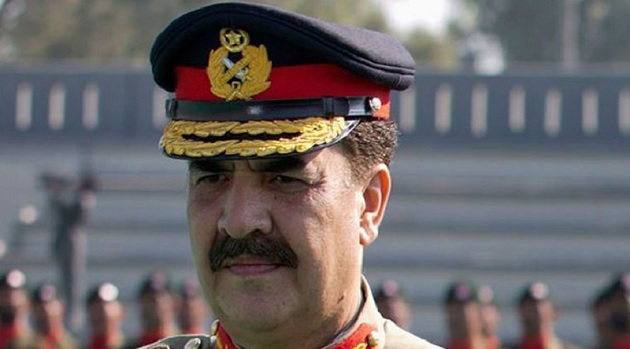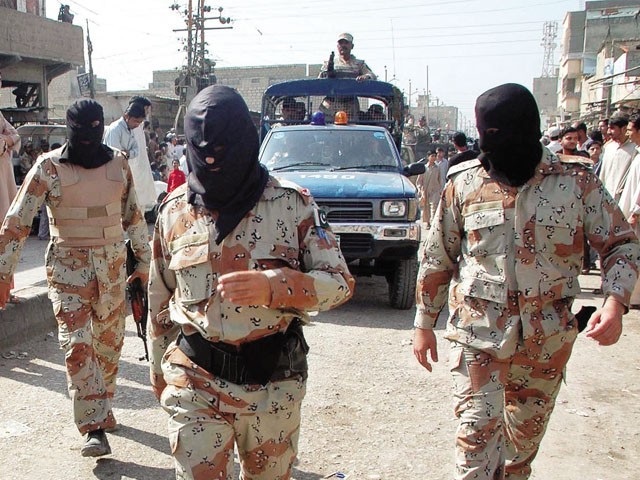By Brig (R) Samson Simon Sharaf
The swiftness, accuracy and effectiveness of Rangers led operations in Karachi in concert with National Accountability Bureau and Federal Investigation Agency against established centers of political corruption and violence should not come as a surprise. Despite a stuttering federal government that got all its priorities wrong and the Sindh political establishment reeked in corruption and violence, the manner in which General Raheel Sharif began the Zarb e Azb left no doubts about his method of doing business.
Though MQM played a measured game of appeasement and defiance, Asif Ali Zardari read the winds and openly challenged the military establishment. When General Raheel did not blink, he with his partners in crime quietly moved overseas leaving his party he had put a long way off course, between the rock and deep sea. Altaf Hussain on his part used every stratagem and holds back his armed gangs realizing that military action against them will be swift and lethal. The foreign funded proxies that supplemented the instability in Karachi are also on the run. Most have been smashed with targeted sting operations. A clean shaven Brahamdagh Bugti has emerged from his sanctuary with a white flag. The only option for PPP once a federal party is affect a divorce, come out clean and jump start its ideology.
The reactive checkmating policy of generals reflecting the old mind-set was not a legacy worth pursuing. During that period, initiatives were ceded at the cost of internal security and economic recession. Reintroduction of democracy through a cantankerous reconciliation made matters worse. NRO democracies became parasitic, plagued by massive corruption and economic attrition at the hands of Hitman. The entire structure of a social contract between the state and the people had collapsed when General Raheel Sharif took over.
A paradigm shift was inevitable and a new team of post 1971 cadre of general officers knew it was their calling. I reproduce what I explicitly wrote nearly a year back in Raheel Sharif’s Paradigm: Nation 22 November 2014: – “Post 9/11, there was a strong view in Pakistan’s younger defence establishment to affect a paradigm shift and rid Pakistan of militancy. They realized that fast track economic development was the key to Pakistan’s security. In the past, much that Pakistan tried was lost within the international paradigm and a mind-set within Pakistan’s senior military general staff. It was a ‘hide and seek’ of the good, the bad and ugly, juxtaposing already existing complications on the war on terror. More than a decade later, the generation of young general staff had come of age. The makings of the paradigm shift have fallen on the shoulders of General Raheel Sharif the COAS of Pakistan Army who in 2002 was a young brigadier.”
Risking the unknown, General Raheel took a plunge into danger. While the government stuttered, the armed forces initiated punitive precision strikes against militant targets with positive results. Within a year, the militants were barricaded into an inhospitable sanctuary of Shawal. Security forces ably backed by Pakistan Air Force had made spatial and moral gains. The entire nation including tribesmen was on its side. The momentum, impetus and effectiveness of these operations forced international observers to concede that effects in Afghanistan were positive. What are the reasons this shift in policy has worked?
First, the military co-opted Pakistan’s Navy, Air Force, Civil Armed Forces and Parliament into the operations. The Inter Services Public Relations launched an effective and measured media campaign to swing public sentiment. Secondly, as a result of the above, the entire nation was galvanized to support counter terrorism operations. Consequently, the pressure generated by public sentiments and media nudged the reluctant government into acquiescence.
Thirdly, military diplomacy repaired the long strained relations with Afghanistan. At the same time many Arab and European states with interests in Balochistan and Karachi were warned to stay away. US State Department, Pentagon and UK were surprised at the pace of operations and comfortable with the tri service military plans. Though irritants keep popping, these relationships have taken the shape of permanent mutual interests.

Fourth, a segment of autonomous organizations like NAB and FIA were willing to follow trails of financial crimes linked to terrorist funding. As the nabbing spreads, other organizations like Security and Exchange Commission, Competition Commission, State Bank of Pakistan, Oil and Gas Regulatory Authority etc. will follow suite. As this happens, the noose around politically franchised crime will tighten. Stability alone will result in remarkable growth.
With the paradigm built on these pillars, the law and order is already showing signs of improvement. People have started returning in South and North Waziristan. The military and its affiliated organizations are spearheading the reconstruction effort. Citizens of Karachi are relieved. Already, the crime has reduced 70% while the local economy has grown three times. Karachi, Pakistan’s biggest port and business juggernaut is once again moving on wheels. Balochistan has begun to open up to rest of the country. Separatists are already realizing the futility of their misadventure and recanting. Gawadar is being linked to CPEC highways to North Pakistan. Oil, gas and mineral exploration will follow.
CPEC is another master stroke of the armed forces. With China’s entry into the region, all maps pertaining to balkanization of Pakistan have been closed for good. General Raheel Sharif is the guarantor of CPEC and its security; no wonder he is seen inspecting CPEC roads being constructed by the army. General Sharif’s unequivocal emphasis on Pakistan is reflected in his policy of not getting involved in Middle Eastern conflicts. Whether the Arabs like it or not, his priority is to render Pakistan a growing and competitive economy of the region and ultimately the world.
Raheel Sharif’s paradigm does not bode well with the Indian thesis of a failed Pakistan. Therefore India must put a spanner into every dynamic that sets the template to the contrary. Indian support of militancy in Pakistan is being exposed regularly. To draw away Pakistani forces from FATA, India heats escalations on the Line of Control and Working Boundary. India regularly threatens Pakistan with military mobilisation in form of training exercises. So far General Raheel has called all bluffs. Any military misadventure by India will be disastrous to say the least. Pakistan Army has emerges from the crises with a changed sociology. A year from now we will hear, “The COAS has retired. Long live the COAS.”







